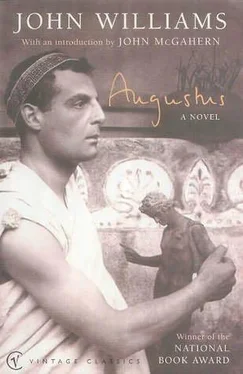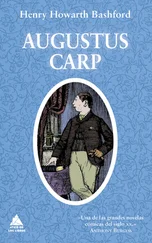John Williams - Augustus
Здесь есть возможность читать онлайн «John Williams - Augustus» весь текст электронной книги совершенно бесплатно (целиком полную версию без сокращений). В некоторых случаях можно слушать аудио, скачать через торрент в формате fb2 и присутствует краткое содержание. Жанр: Историческая проза, на английском языке. Описание произведения, (предисловие) а так же отзывы посетителей доступны на портале библиотеки ЛибКат.
- Название:Augustus
- Автор:
- Жанр:
- Год:неизвестен
- ISBN:нет данных
- Рейтинг книги:3 / 5. Голосов: 1
-
Избранное:Добавить в избранное
- Отзывы:
-
Ваша оценка:
- 60
- 1
- 2
- 3
- 4
- 5
Augustus: краткое содержание, описание и аннотация
Предлагаем к чтению аннотацию, описание, краткое содержание или предисловие (зависит от того, что написал сам автор книги «Augustus»). Если вы не нашли необходимую информацию о книге — напишите в комментариях, мы постараемся отыскать её.
Augustus — читать онлайн бесплатно полную книгу (весь текст) целиком
Ниже представлен текст книги, разбитый по страницам. Система сохранения места последней прочитанной страницы, позволяет с удобством читать онлайн бесплатно книгу «Augustus», без необходимости каждый раз заново искать на чём Вы остановились. Поставьте закладку, и сможете в любой момент перейти на страницу, на которой закончили чтение.
Интервал:
Закладка:
I do not know why I remembered that particular evening; but suddenly, in this Pandaterian twilight, the scene sprang before me, as if it were being re-enacted upon the stage of a theater, and the remembering caught me before I could fend it off.
Marcus Agrippa had returned from the East and joined me in Rome, where he stayed for three months; and I became pregnant with my fourth child. Shortly thereafter, at the beginning of the year, my father sent Agrippa north to Pannonia, where the barbarian tribes were again threatening the Danube frontier. And Sempronius Gracchus, to celebrate my freedom and to herald the arrival of spring, gave a party, the like of which (he promised everyone) Rome had not seen before; all of my friends, from whom I had been separated while my husband was in Rome, would be there.
Despite the libels that were circulated later, Sempronius Gracchus was not my lover then. He was a libertine, and he treated me (as he treated many women) with an easy familiarity that might give rise to rumors, however false. At that time I was still conscious of the position which my father imagined I ought to occupy; and the time that I had been a goddess at Ilium was like a dream that waited to be fulfilled. I had, for a while, become someone other than myself.
Early in March, my father assumed the office of pontifex maximus, which had been vacated by the death of Lepidus; and he decreed a day of games to celebrate the event. Sempronius Gracchus said that if the old Rome must have a high priest, the new Rome demanded a high priestess; so Sempronius had his party at the end of March, and the city chattered with reports of what the guests were to expect. Some said that the guests would be transported from place to place on tamed elephants; some said that a thousand musicians had been brought from the East, and as many dancers; fancy fed upon expectation, and expectation nourished fancy.
But a week before the date of the party, news reached Rome that Agrippa, having more quickly settled the border uprising than anyone expected, had returned to Italy by way of Brindisi. He proposed to travel across country to our villa near Puteoli, where I was to meet him.
I did not meet him. Despite the annoyance of my father, I proposed that I join my husband the following week, after he had rested from his journey.
When I made this proposal, my father looked at me coldly. "I take it that you wish instead to attend that party which Gracchus is giving."
"Yes," I said. "I am to be the guest of honor. It would be rude to refuse, so late."
"Your duty is to your husband," he said.
"And to you, and to your cause, and to Rome," I said.
"These young people that you spend your time with," he said. "Has it occurred to you to compare their behavior with that of your husband and his friends?"
"These young people," I said, "are friends of mine. You may be assured that when I grow old, they will be old, too."
He smiled a little then. "You are right," he said. "One forgets. We all grow old, and we once were young. hellip;. I will explain to your husband that you have duties that keep you in Rome. But you will join him the week after."
"Yes," I said. "I will join him then."
Thus it was that I did not join my husband in the South, and thus it was that I attended Sempronius Gracchus's party. It became, indeed, the most famous party in Rome for many years, but for reasons that no one could have foreseen.
There were no tame elephants to transport the guests from place to place, or any of the other wonders that had been rumored; it was simply a gathering of a few more than a hundred guests, attended by nearly as many servants and musicians and dancers. We ate, we drank, we laughed. We watched the dancers dance, and joined them, to their delight and confusion; and to the sound of tambourines and harps and oboes we wandered through the gardens where fountains augmented the music and the torchlight played upon the water in another dance beyond the skill of human bodies.
Toward the end of the evening there was to be a special performance of the musicians and dancers, and the poet Ovid was to read a new poem, composed in my honor. Sempronius Gracchus had constructed for me a special chair of ebony, and secured it on a slight rise of the earth in the garden, so that all the guests could (as Gracchus said, with that irony he always had) pay me homage…
I sat upon the chair, and saw them beneath me; a breeze came up, and I could hear it rustle among the cypresses and plane trees as it touched my silken tunic like a caress. The dancers danced, and the oiled flesh of the men rippled in the torchlight; and I remembered Ilium and Lesbos, where once I had been more than a mortal. Sempronius reclined beside my throne, on the grass; and for a moment I was as happy as I had been, and was myself.
But in this happiness, I became aware of someone standing beside me, bowing, attempting to get my attention; I recognized him as a servant from my father's household, and motioned for him to wait until the dance was over.
When the dancers had finished, and after the languorous applause of the guests, I allowed the servant to approach me.
"What does my father require of me? " I asked him.
"I am Priscus," he said. "It is your husband. He is ill. Your father leaves within the hour for Puteoli, and asks you to follow."
"Is it a serious matter, do you think?"
Priscus nodded. "Your father leaves this night. He is concerned."
I turned away from him, and looked at my friends who lounged in their ease and gaiety on the grassy slopes of Sempronius Gracchus's garden. The sound of their laughter, more charming and delicate than the music that had moved the dancers, floated up to me on the warm spring breeze. I said to Priscus:
"Return to my father. Tell him that I shall join my husband. Tell him not to wait for me. Tell him that I will leave here shortly, and will join my husband by my own means."
Priscus hesitated. I said:
"You may speak."
"Your father wishes you to return with me."
"Tell my father that I have always done my duty to my husband. I cannot leave now. I will see my husband later."
Priscus left then, and I started to speak to Sempronius Gracchus about the news I had received; but Ovid had taken his place before me, and had begun to speak the poem that he had written in my honor; I could not interrupt him.
At one time I knew that poem by memory; now I cannot recall a word of it. It is strange that I cannot, for it was a remarkable poem. I believe he never included it in one of his books; he said that it was my own, and should belong to no one else.
I did not see my husband again. He was dead by the time my father reached Puteoli; the illness, which the doctors never really discovered, was rapid and, I hope, merciful. He was a good man, and kind to me; I'm afraid he never realized I knew that. And I believe my father never forgave me for not joining him that night.
… It was the truffles. We had a delicacy of truffles that evening at the villa of Sempronius Gracchus. The earthy taste of those truffles was brought back by the earthy taste of this black bread, and that reminded me of the evening when I became a widow for the second time.
V. Poem to Julia: Attributed to Ovid (circa 13 B. c.)
Restless, and wandering aimlessly, I pass temples and groves where
Gods live-Gods who invite passers to worship as they
Pause in the ancient groves where no ax has, in our memory's
Mortal endurance, bit hungrily branches or shrubs.
Where might I pause? Janus watches unmoving as I approach him,
And as I pass him by-quicker than any discerns
Save he. Now: here is Vesta-reliable, nice in her own way,
I think; so I call out. She does not answer me, though.
Vesta is tending her flame-no doubt she is cooking for someone.
Читать дальшеИнтервал:
Закладка:
Похожие книги на «Augustus»
Представляем Вашему вниманию похожие книги на «Augustus» списком для выбора. Мы отобрали схожую по названию и смыслу литературу в надежде предоставить читателям больше вариантов отыскать новые, интересные, ещё непрочитанные произведения.
Обсуждение, отзывы о книге «Augustus» и просто собственные мнения читателей. Оставьте ваши комментарии, напишите, что Вы думаете о произведении, его смысле или главных героях. Укажите что конкретно понравилось, а что нет, и почему Вы так считаете.











